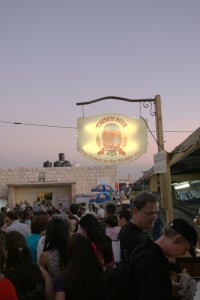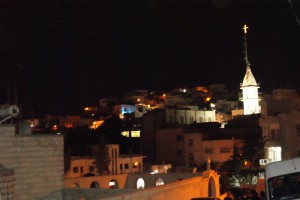A drinker’s guide to Islam
By Khaled Diab
Although alcohol is ‘haram', Muslim societies have rarely managed to stay on the wagon, and vital parts of their culture have developed under the influence.
Tuesday 12 October 2011

If I said that we went to an Oktoberfest last weekend, readers may wonder why I am writing about it. If I added that the beer festival in question was in the West Bank and there we encountered a couple of self-deprecating young Germans dressed in lederhosen, some may start asking themselves what I've been drinking, or perhaps smoking.
To add to the bizarreness of the situation, this Oktoberfest, the seventh of its kind, took place not in hip Ramallah but in the remote village of Taybeh, perched picturesquely at 850m above sea level and with a population of just 1,500. Moreover, as my wife pointed out, fellow Belgians – who possess not only the world's best beers but also perhaps the greatest per-capita distribution of breweries – and other Europeans may wonder why thousands upon thousands of revellers had trekked all this way to attend a beer festival with only one beer on tap.
Secular Palestinians, expats and even leftist Israelis equipped with glasses of Taybeh beer wandered around food and handicraft stands, watched traditional Dabke dancers – which our toddler son strutted his stuff to – modern music, comedy and theatrical performances.
Despite its remoteness and tiny proportions, Taybeh has earned its place on the cultural and social map as being the location of the only Palestinian beer brewery. It has battled the restrictions imposed by the Israeli occupation and the rise of Islamic fundamentalism to become a rare Palestinian business and cultural success story.
This may explain why Taybeh once adopted “Taste the revolution” as its advertising slogan. And, judging by its micro-brewery quality, the revolution tastes pretty good.
The very existence of Taybeh overturns the stereotype associated with Palestinians – and Arabs in general – as teetotal, fanatical Muslims. This caricature has been reinforced since Hamas's takeover of Gaza, where the Islamist party has imposed a de facto ban on alcohol, though bootlegging has become a popular, if risky, pastime.

There are those who will protest that Taybeh is the exception that proves the rule. After all, it is the only Palestinian brewery, and it is owned and run by Christians. But the absence of local competitors has more to do with the difficulty of setting up a viable business in the Palestinian territories, which requires a certain foolhardiness and courage – and, anyway, most of the people who drink Taybeh are Muslims.
In the wider Arab and Muslim context, booze is widely available. Although alcohol is generally considered to be haraam (forbidden) in Islam, only the most conservative countries actually impose a legal ban on it. Egypt, for instance, has a booming local alcohol industry that has been growing for years.
This is not just a recent Western import or “innovation“, as conservative Muslims might believe. In fact, the history of the region where beer and wine were probably invented shows that most societies there have a long track record of falling off the wagon. The prominent 19th-century orientalist Edward William Lane – famous for his incredibly observant if somewhat condescending book, Manners and Customs of the Modern Egyptians – provides, in one of his lesser-known works, some fascinating details about the drinking habits of Egyptians.
“From the conversations and writings of Arabs,” he notes, “drinking wine in private and by select parties is far from being uncommon among modern Muslims.” Lane also alludes to the fact that boozing was even more common in earlier centuries, before the introduction of tobacco and coffee as substitutes. Interestingly, the Arabic word for coffee, from which the English word derives, originally meant “wine”. That's something to mull over while sipping on your morning caffeine shot.
There is plenty of historical evidence to back Lane's assertion. Numerous prominent Muslims throughout the ages drank alcohol. Even caliphs, such as the Abbasid ruler Haroun al-Rashid of One Thousand and One Nights fame, were reputed to indulge, despite their title of “commanders of the faithful”.
Alcohol has played so prominent a role in Islamic history that many aspects of its various cultures and societies were formed under the influence, so to speak. This is evident not only in the starring (or should that be staggering?) role that booze has played over the decades on the silver screen, but also in traditional poetry and song.
Pre-Islamic Arabic poetry is famous for its odes to wine, known as khamariyat, and this tradition continued into the Islamic era. Take Abu Nuwas, Haroun al-Rashid's camp court poet. In addition to his homoerotic ghazal, he penned endless verse in praise of wine.
Although he was considered to be the greatest Arab poet ever during his lifetime, Nuwas has fallen out of favour with the modern Muslim reader. But he is not alone in talking up the virtues of drink. The celebrated poet and polymath Omar Khayyám wrote extensively about wine and love, as did the legendary Sufi mystic Rumi.
Modern-day puritans will argue that Khayyám and Rumi used wine and drunkenness as a metaphor for spiritual intoxication. But there's no reason why their poetry should not be read both literally and figuratively, as mystics have long used alcohol (after all, we do use the term “spirit” to describe some drinks) and other drugs to alter their consciousness in pursuit of the divine.
The relatively relaxed attitude to alcohol in the earlier centuries of Islam may have been due to doubts, in the days before the religion had hardened into rigid orthodoxy, as to whether the Qur'an actually prohibits the consumption of alcohol or merely recommends moderation and/or abstinence. Some hadith (traditions of the prophet) even suggest that Muhammad may have actually drunk mildly alcoholic beverages.
Regardless of whether this is the case or not, devout Muslims have every right to consider alcohol haraam and not part of Islam the religion. But they must also accept that alcohol has always been an integral and largely tolerated aspect of Islamic culture.
This article first appeared in The Guardian's Comment is Free section on 8 October 2011. The related discussion can be viewed here.


Pingback: A war on erroneous myths about Muslims - The Chronikler
Pingback: Memo To ISIS: A Successful Caliphate In Six Simple Steps | Pretty Awesome
Pingback: Memo To ISIS: A Successful Caliphate In Six Simple Steps | Viral Dojo
Pingback: Memo To ISIS: A Successful Caliphate In Six Simple Steps
Pingback: Memo To ISIS: A Successful Caliphate In Six Simple Steps | Sharing Interesting Stuff, Updates News & Free Tips
Pingback: 6 Things That ISIS Gets Completely Wrong About Creating An Islamic Caliphate | GossipViews.com
Hola Khalid. Nice article and mostly based on real history. Ummayeds and Abbasids are notorious for their consumption of alcohols and engaging in immoral activities as well. But I strongly differ with the point at the end. The hadiths regarding the heinous allegation on Prophet Muhammad saww are fabricated and are mostly from takfiris’ books. They are the ones paving ways for immorality in Islam by associating rubbish things with Prophet saww. Please next time read authentic books. And don’t join the malign train like them. Thank you.
Oh btw there was a documentary on Nat Geo I think regarding Taybah.. It’s interesting. Do watch if u can. Adios.
The hadith in question appeared in Sahih Muslim, so according to the mainstream view of hadith, it is authentic. Just because a truth is inconvenient, that does not make it any less true.
Half of hadiths in Sahi Muslim and Sahi bukhari are deemed incorrect by many schlors. So your argument is invalid.cheerio.
Where can I get this beer in the U.S. ? I want to switch my brand!
As far as I know, Taybeh is, unfortunately, not available in the United States.
Hi Khaled, once again a finely written piece about a well observed phenomenon, thanks! I wouldn’t dare to ask what the Thaybeh was like 🙂 anyway, there’s good news from the Middle Eastern/North African viticulture: production ànd quality are improving, and as I’ve been told, more and more indigenous grapes are being cultivated. Lebanon has a big step ahead with chateaux which have access to the European markets. To tease your appetite: if you know any French, look for “Anthologie du vin et de l’ivresse en Islam” by Malek Chebel – ed. Pauvert. I’m desperately looking for it here in bxl! Keep up the good work and… get some bubbels for your b-day, cheers!
Hey khalid I read your article!! And found it funny yet interesting the way you spoke of the whole matter of drinking! But what’s more interesting the replies of the westerns under your article on The Guardian. Many have positive comments , glad to find “similarity” between them and the Middle Easterns.
As much as I always try to show any western i speak to that human beings are all the same, most of us have similar interests, and its not religion that only defines our lifestyle but it is our principles too!! But am not sure again if speaking of beer and that our Prophet(PBUH) had a few sips of beer is what will make the westerns have a better understanding of the Arabs nations (Muslims or Chritian Arabs)
Our culture definitely doesn’t stop there! we got much more to look at and tell the whole world , hello we r just as normal as you are, Arabs dont spend their lifetime thinking of violence and terrorism!
Your article is again interesting , yes a lot of Arabs (Muslims and Christians) drink alcohol but the problem is that people with their vast opinions, take you far away from your simple story to a big fussy conclusion.
hmmmm You got my point??! Hope so!
Had it not been for some misbehaving Beduins in the early days of Islam who went blotto inside the mosque , the moderate consumption of alcohol could have been allowed; then we could have debated the divine meaning of moderation while enjoying my beer and your champagne….
That is precisely the point. Why should you be deprived of drinking of your beer and I be drinking my champagne in Iran or Palestine because some desert arabs were not able to control their drink 1,400 years ago?
If you believe in Islam then beer is Haraam, if you are a Kaffir and love Dajjals system then by all means drink drink drink. Is it an accident the Lord is destroying the Arab nations because they have gone astray from the Great Book Quran? Most Arabs are Kaffirs and I’m proud for the fact USrael is bombing them all to hell.
Alcohol is and has been a pretty controversial thing all over the world. I am sure you folks know about prohibition. It turned America into a giant organized crime society. Banning it has destroyed a great industry and tradition in Iran.
What you may not know is that Zoroastrian priests banned is for a period of Sassanids. Then decided to allow it in moderation. That is what America also did. Of course it is impossible to impose moderation since once you get alcohol you may drink all you want. But that is really a personal matter and best left to people. What is a shame is Shiraz grapes are from Iran but we don’t get to make it. Now it is made in California and Australia. The city of Abarshahr was known for its wine: but no more. Thankfully Armenians; Jews and Zoroastrians are keeping the tradition alive. The grapes survived, One of the fringe benefits of religious minorities 🙂 I really hope to see the day wine making is back. In Iran and to enjoy a glass of real Shiraz wine from Shiraz!